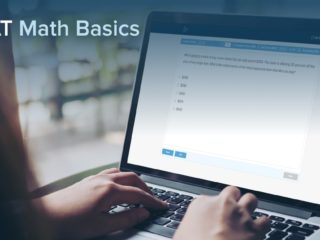| Getting your Trinity Audio player ready... |
Quant skills play a critical role in admissions, the curriculum, and many post-MBA careers. Therefore, MBA math is essential! If you have a low GPA or lack quant experience, additional coursework can strengthen your application. Specifically, coursework through MBA Math, HBS CORe, or a university extension program can demonstrate your quant capabilities.
How do you choose among several options?
In this guide, we’ll compare MBA Math, HBS Online CORe, and university extension courses to help you identify the best course for your needs.
Here are the topics we’ll cover:
- Why MBA Applicants Consider Additional Quantitative Courses
- Comparing HBS CORe, MBA Math, and University Extension Programs
- Which Course Is Right for You? (Decision Guide)
- Common Pitfalls to Avoid
- Key Takeaways
- Frequently Asked Questions (FAQ)
- Is an alternative transcript necessary for MBA admissions?
- What are the key differences between HBS CORe, MBA Math, and university extension courses?
- Who should consider taking HBS CORe or MBA Math for their MBA application?
- Which option provides the strongest proof of quantitative readiness for top MBA programs?
- What’s Next?
Why MBA Applicants Consider Additional Quantitative Courses
Many MBA programs, especially schools such as Harvard Business School, Wharton, and Stanford GSB, seek strong quant capabilities. After all, these programs expect students to tackle MBA math problems and MBA math classes immediately. Therefore, some MBA applicants take additional quant coursework. This coursework helps applicants:
- Address a low GPA — Candidates with a below-average GPA can create an alternative transcript. This demonstrates their ability to perform academically.
- Bolster their academic credentials — Applicants from non-traditional backgrounds can prove their ability to handle quant coursework.
- Build confidence with MBA admissions committees — Applicants take quant courses to fulfill the above objectives and prepare for rigorous MBA math classes.
KEY FACT:
Additional quant courses can help applicants address a low GPA, bolster academic credentials, and build confidence.
Comparing HBS CORe, MBA Math, and University Extension Programs
Each of these programs has unique strengths. Understanding them will help you determine which is best for your MBA applications.
Let’s take a closer look:
| Program | Best for | Curriculum | Cost | Recognition |
|---|---|---|---|---|
| MBA Math | Applicants who need a flexible and low-cost course to build quant skills | Statistics, finance, and accounting in an Excel-based environment | $169 | Recognized by some MBA programs |
| HBS CORe | Applicants who want to learn business fundamentals and leverage the Harvard brand | Business Analytics, Economics for Managers, and Financial Accounting | $2,650 | Well-respected by HBS and other top MBA programs |
| University Extension Courses (i.e., UCLA Extension or UC Berkeley Extension) | Applicants seeking a structured course and academic credit | Various (including Math for Management, Principles of Financial Accounting, etc.) | Courses start at around $850 each | Recognized for providing graded transcripts |
TTP PRO TIP:
Research your options for additional coursework to determine which programs are best for you.
Which Course Is Right for You? (Decision Guide)
Each course or program offers distinct benefits. However, it may not be clear which is best for your situation.
Ask yourself the following:
- Are you looking for the most affordable and/or flexible course?
- If so, choose MBA Math, which is self-paced and offered at a lower cost.
- Does prestige or a brand name matter to the MBA programs you are targeting?
- If so, HBS CORe may be the best option.
- Do you need a graded transcript?
- If so, enroll in University Extension Courses such as UCLA Extension or UC Berkeley Extension.
- Are you applying to a program that explicitly recommends MBA Math?
- Check the Schools Table and decide whether MBA Math makes sense.
If in doubt, chat with your MBA admissions consultant or an admissions counselor at one of your target MBA programs.
TTP PRO TIP:
Consider affordability, flexibility, brand recognition, and other factors to decide on the best program for your situation.
Common Pitfalls to Avoid
When you’re evaluating quant coursework, here are the common mistakes to avoid:
- Assuming all programs accept MBA Math — Not all programs accept MBA Math as an alternative transcript. Therefore, it’s important to speak with admissions and carefully review the Schools Table.
- Overestimating the brand value of HBS CORe — While Harvard is a prestigious brand, completing this coursework doesn’t guarantee admission to a top MBA program.
- Choosing non-graded courses if you have a low GPA — MBA admissions committees may prefer to see official transcripts from graded courses.
TTP PRO TIP:
Confirm whether your target program accepts MBA Math before committing to the course.
Key Takeaways
Which MBA math course is best for you? Choosing the best quant course depends on many factors. Specifically, these factors include your background, your goals, and your target MBA programs. To summarize:
- If you need a low-cost and flexible refresher course, go with MBA Math.
- If you want to enroll in a well-recognized program, enroll in HBS CORe.
- If you need official grades, university extension courses are your best bet.
Next, research your target program’s MBA math requirements. Then, choose a course that aligns with your MBA application strategy.
Frequently Asked Questions (FAQ)
Is an alternative transcript necessary for MBA admissions?
An alternative transcript is not mandatory for MBA admissions. However, it can be beneficial for certain candidates. While MBA programs assess candidates holistically, quantitative capabilities and academic readiness are critical. If you have a low GPA, lack quant coursework, or did not perform well in quant-related coursework, consider building an alternative transcript.
What are the key differences between HBS CORe, MBA Math, and university extension courses?
Review the table in this guide to understand the key benefits across each of these options.
Who should consider taking HBS CORe or MBA Math for their MBA application?
Both HBS CORe and MBA Math can help candidates strengthen their MBA applications. However, we recommend these courses for different types of candidates.
For example, you should take MBA Math if you want an affordable and self-paced option. Additionally, choose MBA Math if you want to demonstrate quant competency, but don’t need a grade. Finally, choose this course if your target MBA program accepts MBA Math.
Alternatively, choose HBS CORe if you want a Harvard-branded credential. Additionally, consider HBS CORe if you’re applying to HBS or other programs that recognize the certification. Finally, choose HBS CORe if you want a structured course that includes economics, business analytics, and financial accounting.
Lastly, choose extension courses if you need an official transcript with grades to offset a low GPA. Additionally, select extension courses if you need to demonstrate proficiency in specific quantitative subjects.
Which option provides the strongest proof of quantitative readiness for top MBA programs?
The strongest proof of quantitative readiness depends on your target MBA programs. Additionally, you must consider what an admissions officer is looking for. This also depends on your academic and professional background.
We’ve detailed some of these considerations in the table in this article. Therefore, we recommend that you consider your situation and target MBA programs to choose accordingly.
What’s Next?
If you’re interested in pursuing an MBA but are unsure about your qualifications, we can help! Target Test Prep’s experienced MBA admissions consultants will review your profile and make recommendations.



